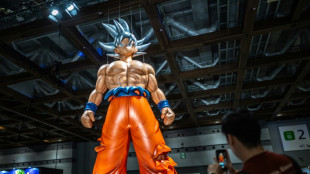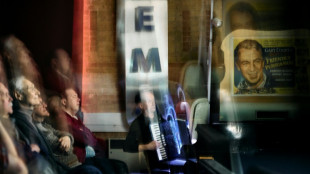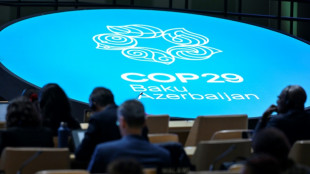
-
 'An inauspicious day': the landmines ruining Myanmar lives
'An inauspicious day': the landmines ruining Myanmar lives
-
UN to vote again on Gaza ceasefire, US plans unclear

-
 Japan's manga powerhouse 'Dragon Ball' turns 40
Japan's manga powerhouse 'Dragon Ball' turns 40
-
Japanese, Koreans bottom of global love life survey

-
 Son blames 'mistakes' after South Korea held by Palestine in qualifier
Son blames 'mistakes' after South Korea held by Palestine in qualifier
-
Japan ramps up tech ambitions with $65 bn for AI, chips

-
 Lights, action, melodrama! Silent films get new reel at London haven
Lights, action, melodrama! Silent films get new reel at London haven
-
Myanmar led world in landmine victims in 2023: monitor

-
 ICC to sentence Timbuktu war criminal
ICC to sentence Timbuktu war criminal
-
Ugandan opposition figure Besigye 'kidnapped', says wife

-
 Australia's Jason Day eyes more major glory after resurgence
Australia's Jason Day eyes more major glory after resurgence
-
Machu Picchu security boosted after visitors spread human ashes

-
 Popovic hails Australia character in 'crazy' World Cup qualifier
Popovic hails Australia character in 'crazy' World Cup qualifier
-
Taliban govt clearing 'un-Islamic' books from Afghanistan shelves

-
 Argentina beat Peru as Uruguay hold Brazil
Argentina beat Peru as Uruguay hold Brazil
-
Asian markets struggle as traders weigh geopolitical tensions

-
 Tatum stars as Celtics end Cavaliers unbeaten start
Tatum stars as Celtics end Cavaliers unbeaten start
-
Hurting India under pressure in blockbuster five-Test Australia series

-
 'They killed her dream': Israel strike leaves woman footballer in coma
'They killed her dream': Israel strike leaves woman footballer in coma
-
Iraq holds its first census in nearly 40 years

-
 Iraqis face tough homecoming a decade after IS rampage
Iraqis face tough homecoming a decade after IS rampage
-
Russian net tightens around last civilians left in eastern Ukraine

-
 Olympic champion Tebogo aims to inspire next generation of African athletes
Olympic champion Tebogo aims to inspire next generation of African athletes
-
Valencia on target as ten-man Ecuador upset Colombia

-
 'Rust' to premiere three years after on-set shooting
'Rust' to premiere three years after on-set shooting
-
Strike at French cognac maker Hennessy over measures in China spat

-
 Xi, Lula meet in Brasilia to 'enhance ties'
Xi, Lula meet in Brasilia to 'enhance ties'
-
SpaceX fails to repeat Starship booster catch, as Trump watches on

-
 'I have left a legacy': Nadal retires from tennis
'I have left a legacy': Nadal retires from tennis
-
US recognizes Venezuela opposition's Gonzalez Urrutia as 'president-elect'

-
 European powers, US seek to censure Iran at UN nuclear watchdog board
European powers, US seek to censure Iran at UN nuclear watchdog board
-
UNAIDS chief says husband, Ugandan opposition figure Besigye, 'kidnapped'

-
 Nadal's sensational career ends as Netherlands defeat Spain in Davis Cup
Nadal's sensational career ends as Netherlands defeat Spain in Davis Cup
-
US announces talks with Israel over civilian casualties in Gaza

-
 SpaceX fails to repeat Starship booster catch, as Trump looks on
SpaceX fails to repeat Starship booster catch, as Trump looks on
-
G20 summit ends with Ukraine blame game

-
 Trump appoints TV celebrity 'Dr. Oz' to key US health post
Trump appoints TV celebrity 'Dr. Oz' to key US health post
-
European stocks fall on Ukraine-Russia fears, US focused on earnings

-
 Last-gasp Szoboszlai penalty rescues Hungary draw with Germany
Last-gasp Szoboszlai penalty rescues Hungary draw with Germany
-
Germany, Netherlands draw as Nations League group stage ends

-
 Hong Kong tycoon Jimmy Lai takes witness stand in collusion trial
Hong Kong tycoon Jimmy Lai takes witness stand in collusion trial
-
Guardiola set to extend stay as Man City boss - reports

-
 Minnows Botswana hold Egypt to qualify with Mozambique, Tanzania
Minnows Botswana hold Egypt to qualify with Mozambique, Tanzania
-
Inter Miami coach Martino leaving club for 'personal reasons' - club source

-
 Chinese man sentenced to 20 months for Falun Gong harassment in US
Chinese man sentenced to 20 months for Falun Gong harassment in US
-
Hong Kong court jails 45 democracy campaigners, drawing condemnation

-
 'I did it for Rafa': Alcaraz after keeping Spain Davis Cup dream alive
'I did it for Rafa': Alcaraz after keeping Spain Davis Cup dream alive
-
Alcaraz keeps Spain and Nadal Davis Cup dream alive

-
 Trump names China hawk Howard Lutnick commerce secretary
Trump names China hawk Howard Lutnick commerce secretary
-
Europe's pivotal role in bid to strike COP29 climate deal


Former hostages unmask Islamic State 'Beatle' at trial
Former hostages taking the witness stand at the trial of their alleged Islamic State group captor have described their brutal treatment in chilling detail.
Eight former IS hostages have testified so far at the trial of El Shafee Elsheikh, accused of being a member of the notorious kidnap-and-murder cell known as the "Beatles."
But in a quirk of the case -- none of the former IS captives has been asked so far to formally identify their alleged captor in court.
That's because the 33-year-old Elsheikh and the other alleged "Beatles" -- so-called because of their British accents -- took pains to conceal their identities.
The former hostages said they were frequently blindfolded and their captors wore balaclavas at all times with only a slit for the eyes.
"They always tried to protect themselves," said Edouard Elias, a French photographer held prisoner by IS from June 2013 to April 2014.
"With other guards I could get some information, but not with them," Elias said. "I just saw that one had a darker skin, that's all."
The kidnappers also had a "rule" whenever they entered the cells where the prisoners were held.
"We had to kneel down with our face toward the wall and never look them in the face," said Federico Motka, an Italian aid worker who was held for 14 months, longer than any other hostage.
"We had to cover our face," said Frida Saide, a former Doctors Without Borders (MSF) worker who was held for three months.
Nicolas Henin, a French journalist, told the court the hostage-takers apparently believed that "as long as they were masked they were protected from prosecution."
"This was maybe a stupid idea," Henin said.
- Use own words against him -
Despite the precautions taken, prosecutors are confident they can prove to the jury beyond a reasonable doubt that Elsheikh, a former British citizen, was one of the "Beatles."
Elsheikh and another alleged "Beatle," Alexanda Amon Kotey, were captured in January 2018 by a Kurdish militia in Syria while attempting to flee to Turkey.
They were turned over to US forces in Iraq and flown to the United States to face charges of hostage-taking, conspiracy to murder US citizens and supporting a foreign terrorist organization.
Elsheikh is charged with the murders of American freelance journalists James Foley and Steven Sotloff and aid workers Kayla Mueller and Peter Kassig and suspected of the kidnapping of nearly 20 other Westerners.
Kotey pleaded guilty in September 2021 and is facing life in prison.
Elsheikh, who pleaded not guilty, is not expected to testify at his trial but prosecutors have been using his own words against him.
After his capture, Elsheikh gave interviews to several media outlets and prosecutors have played excerpts from those interviews for the jury.
In the interviews, Elsheikh acknowledged interacting with the hostages but claimed he did no more than ask them for information -- email addresses, for example -- so the kidnappers could open ransom negotiations with their families.
Elsheikh also sought to deflect responsiblity on another member of the "Beatles," Mohamed Emwazi, the IS executioner known as "Jihadi John" who was killed by a US drone in Syria in November 2015.
- 'Like a team' -
The former hostages tell a far different story -- brutal beatings at the hands of all three "Beatles," waterboarding, electric shocks and other forms of torture.
"George was into boxing. John kicked a lot. Ringo talked a lot about how he liked wrestling, putting people in headlocks," Motka said.
"It was like a team," Elias said.
Saide, the ex-MSF worker, said they were "friendly, comfortable around each other."
"They seemed to be good friends," she said.
The former hostages have testified that even if they could not see their faces they could easily recognize the "Beatles," even from the individual ways they would knock on their cell doors.
Besides their distinctive British accents, the "Beatles" were also better equipped than the other guards with expensive pistols and walkie-talkies..
In court, Elsheikh resembles a college student wearing fashionable civilian clothes and oversized glasses. A long black beard protudes from beneath his black Covid mask.
During witness testimony, he appears to spend most of his time staring straight ahead of him.
Elsheikh's lawyers have seized on the question of identification in mounting his defense.
In opening arguments, they acknowledged he was an IS jihadist but insisted he was not one of the "Beatles" and it was a case of "mistaken identity."
Ch.Campbell--AT
